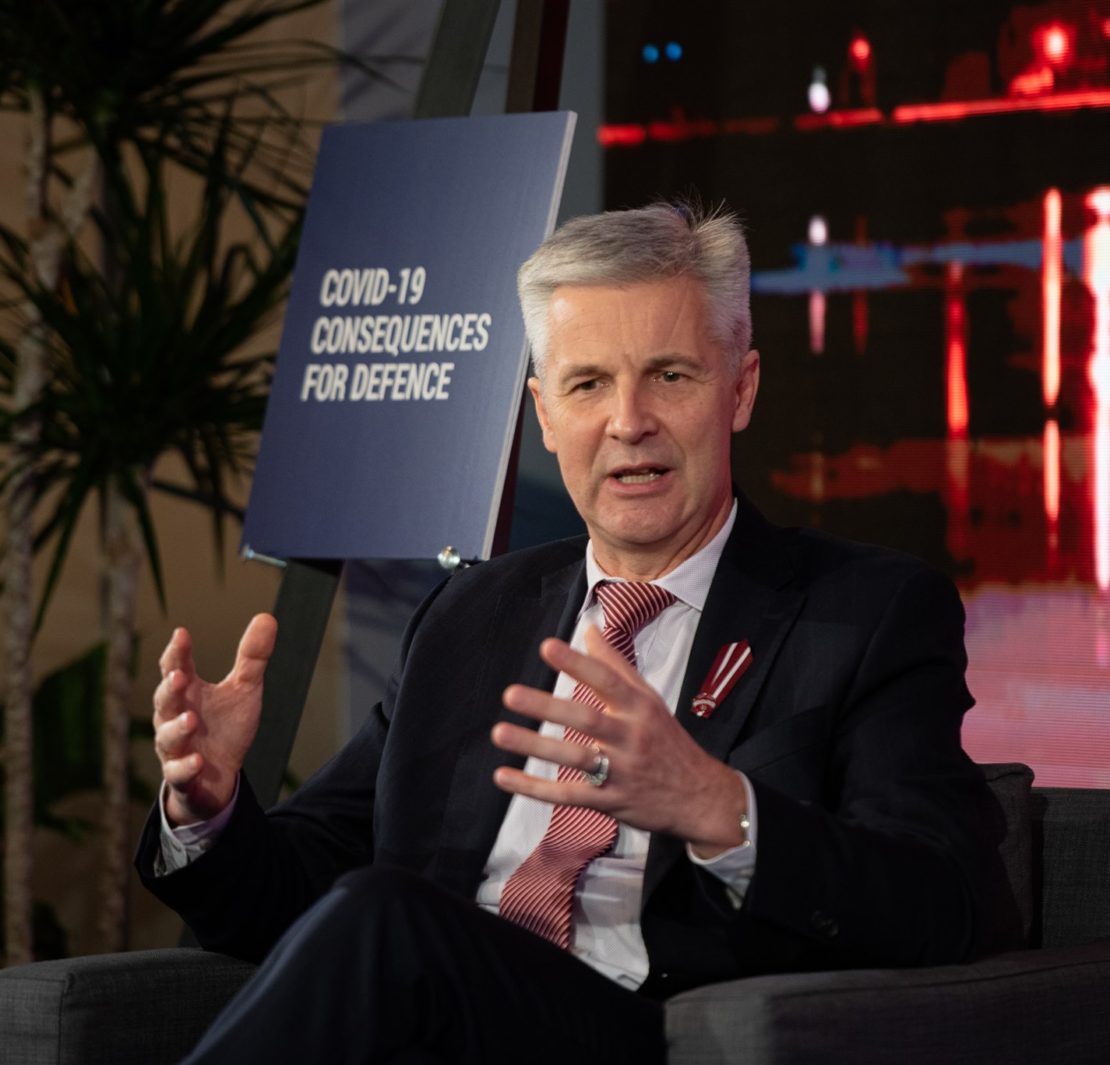Panel Participants:
Dr. Artis Pabriks, Deputy Prime Minister, Minister of Defence of the Republic of Latvia
Harjit S. Sajjan, Minister of National Defence of Canada
The Rt. Hon. Ben Wallace, Secretary of State for Defence of the United Kingdom of Great Britain and Northern Ireland
Jüri Luik, Minister of Defence of the Republic of Estonia
Moderator:
Jānis Sārts, Director, NATO Strategic Communications Centre of Excellence
The first discussant set the stage by comparing Covid-19 to an unplanned crisis stress test, with two levels of implications for defense; international and national. Nationally, the alliance understood that the traditional way of thinking about globalization has changed. Suddenly when countries needed personal equipment, it was discovered there are no factories, deliveries, and prices available. Internationally, Chinese partners were not selling to members of the transatlantic alliance. A similar situational analogy can be used for a military threat. It is unclear whether we have access to oil reserves and what the state of supply lines is. In theory, countries need three months of reserves, but most keep their reserves beyond their borders which is problematic if supply lines are not functional. A similar issue can be ascertained with regard to food reserves – it is unclear to what extent these reserves are in order or can be mobilized.
Another discussant brought up more traditional challenges. The conflict between Armenia and Azerbaijan and Turkey’s role highlights that there is a challenge to Regional dominance, and military conflict can still take place. As every nation will have a challenge of dealing with budget deficits, its important to keep spending on collective defense in the context of NATO. It must be borne in mind, that investments made into defense are still made into the general economy.
Discussants agreed that as a result of Covid-19 the world would be more anxious going onwards. Internal stability will become a priority focus, especially with more and more governments prone to requiring lockdowns or enacting other unpopular policies. Economies are likely to regress and in economies that cannot handle this stressor, it may lead to more conflict internally and with neighbors. As is already visible by ongoing conflicts, adversaries may try to use this moment of weakness to divide the world – these adversaries have little regard for voters and welfare, which is a strategic advantage for them. To this end, it is important that the Western alliance catches up with adversaries in investment to ensure that third-country partners are not taken advantage of. The next question raised is what added value NATO could provide the external partners: transport, supplies and logistics were considered.
The next questions raised concerned the key security challenges upon the entry of the vaccine and the “conquering” of Covid-19. Discussants raised that many old threats will remain, with potentially new and more powerful tools at their disposal including cyber capacity, more effective propaganda, and being better able to take advantage of the increased reliance on computer networks in the transatlantic alliance. Major challenges will continue with Russia, which remain especially crucial for the Baltic states. It is clear that China is also going to be a big challenge and that no real unified position and strategy working with and preparing against it exists yet. Even regarding epidemiologic issues themselves, a global strategy may be worth investigating.
Another discussant continued by emphasizing the changing global dynamics which increasingly encompasses tools like trade favoritism, narratives, soft power use over resources, etc. Countries may not live up to the ideals of being equal partners – tendencies which can be magnified through nationalistic narratives in more authoritarian nations. Standard bearers for free trade will have to consider what fair play means and what the rules are. It will be important to observe how China and other countries challenging the status quo react to invitations for cooperation or international investigations.
Discussants agreed that there needs to be a system of burden sharing among countries in light of these rising threats – individual nations can easily become targets for cyber actors, espionage, and disinformation. Partners across the transatlantic need to ensure that government institutions have capacity to share resources and work against these threats together. Though we have many regional and national bases for traditional conflicts – the new cyber and other soft threats are still very fractured with regards to defensive capacity.
The discussion was ultimately summarized in two core points. First, the alliance should not take itself and its strengths and the status quo for granted – stability today is not stability tomorrow. Second, there are many challenges ahead and our toolbox must always be full of tools to counter these threats, but it must be filled together not separately.

